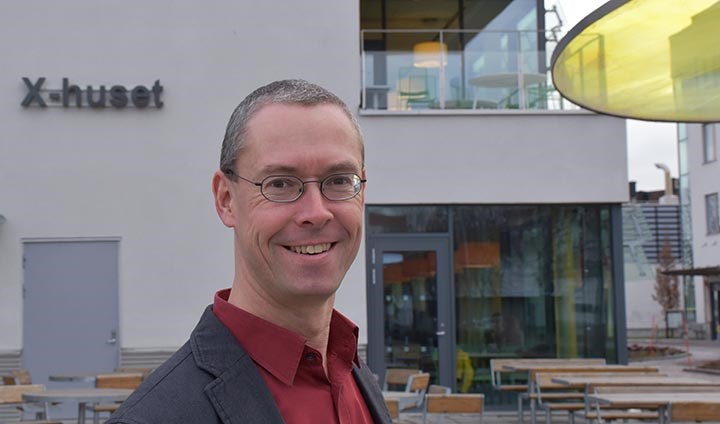Dirk Repsilber - new professor 2017

Dirk Repsilber is professor of medical science with a specialisation in functional bioinformatics. His research targets identifying individual molecular patterns in patients, which either explain their specific disorder – or contribute to tailoring treatment to the individual patient’s needs.
Facts:
1971 Born in Lübeck, Germany
1999 Obtained his PhD in ecological genetics at University of Hamburg, Germany with his thesis Genetic Investigations about the variation of metabolic regulation of forest trees using phosphoenolpyruvate-carboxylase of spruce (Picea abies) as an example
2000- Research posts at Uppsala, Lübeck, Potsdam, Rostock and Örebro
2015 Docent in medical science with a specialisation in biomedicine at Örebro University
2016 Professor of medical science at Örebro University
Dirk Repsilber studied biophysics, biochemistry and mathematics and obtained his PhD in ecological genetics. He did postdoctoral research in bioinformatics when the field first emerged.
“I wanted to study both mathematics and biology. In my spare time, I programmed simulations of ecological and evolutionary systems. Later, my thesis led me to the analysis of molecular regulatory networks. I came to understand that life’s mechanisms are always a cooperation of several, frequently hundreds, different molecules, and that the structure of this cooperation isn’t a simple hierarchy, but always a network.”
During his postdoctoral research at Uppsala University, Department of Molecular Evolution, Dirk Repsilber worked with the first microarray gene expression studies, where tens of thousands of molecules could be studied at the same time. He also cooperated with statisticians at the Institute for Biometry and Statistics, Swedish University of Agricultural Sciences (SLU), Uppsala. At the same time, he completed several distance learning courses in statistics and informatics.
“If you want to know how life’s molecular networks function, you have to be able to map and measure all the molecules that are interacting – at the same time. Even today, I’m fascinated by molecular networks.”
Dirk Repsilber’s continued with his postdoctoral studies at several research institutes in Germany. He focused on clinical studies, on the adaptation in plants to harsh environmental demands, and on genetic studies in cows, pigs and mice. Parallel to this, he always collaborated with human studies, especially with research in tuberculosis, Alzheimer’s disease and with molecular patterns in human stem cells.
“I’ve always had two pillars in my research – data analysis and method development. On the one hand, I analyse molecular data together with someone who knows the particular patients, animals or plants. On the other, I further develop methods that are used to analyse this type of data. In this way, I get a brilliant diversity in my projects – amassing many different experiences in a variety of biological and medical systems.”
Three years ago, Dirk Repsilber accepted the opportunity to draw up plans for bioinformatics at Örebro University, with his specialisation in functional bioinformatics. Besides collaborating primarily with medical researchers, he also works with biologists and chemists. The focus is on molecular biological networks, data analysis and method development.
Over the decades, the amount of data analysed for each patient in healthcare has expanded exponentially. Finding basic patterns to improve diagnosis, prognosis and tailoring therapy requires modern statistical methods, like machine learning and artificial intelligence.
“It is an interdisciplinary field, where the focus is not only on the interaction of molecules but also on networks and collaboration between researchers,” says Dirk Repsilber.
